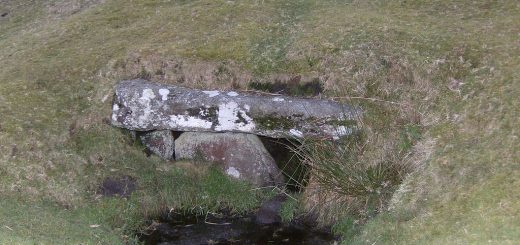Moyles Court
Mentioned in the Domesday Book (1086) as being held by Cola the Huntsman, Moyles Court is now a private school on the edge of the New Forest in Hampshire. It was once the home of Lady Alice Lisle who was executed for sheltering traitors following the Monmouth Rebellion which has been described as judicial murder. According to ‘Haunted England: A Survey of English Ghost Lore’ (1941) by Christina Hole,‘Tradition says the sound of her silk dress and tapping of her heels were long afterwards heard in the corridors of Moyles Court, and that sometimes she was seen passing down Ellingham Lane a driverless coach drawn by headless horses.’
Lady Alice Lisle (born September 1617 – died 2 September 1685) was the daughter of Sir White Beconshaw of Moyles Court. In 1630 she bacame the second wife of the Regicide Sir John Lisle (1610-1664) who was a Judge in the trial and execution of King Charles I. According to The Complete Peerage (Vol IV, Appx G, p.622) ‘He was a violent anti-royalist, and active promoter of the King’s trial, and drafted the sentence. He was present in Westminster Hall, 27 Jan 1648/9, when the sentence was pronounced, though he did not sign the death-warrant.’ He was assassinated by Thomas Macdonnell (also known as O’Croli) and Semus mac Emoinn Mhic Choitir (or James Fitz Edmond Cotter / James Cotter) in Lausanne, Switzerland where he had fled following the Restoration of the Monarchy. At the time of King Charles I’s execution, Alice Lisle was reported to had stated ‘her heart leaped within her to see the tyrant fall’ but much later, probably during her trial claimed ‘shed more tears than any woman then living did’ for the dead King. A quote from Burnett in the Salisbury Journal sates , ‘She was not easily reconciled to her husband on account of his association with the regicides.’
 Lady Lisle was in London during on 6th July 1685 when the Monmouth Rebellion was crushed at the Battle of Sedgemoor. On 20th July 1685 she received a message from John Hickes requesting shelter. Hickes was a known Nonconformist minister and she suspected he was in trouble for illegal preaching. He was also a member of Monmouth’s army who had been on the run since Sedgemoor, though Alice claimed she knew nothing of this. Hickes arrived several days later with another rebel named Richard Nelthorpe. The following day Hickes, Nelthorpe and Lisle were arrested by Colonel Penruddock, the men for being traitors and the seventy year old Alice for harbouring them. Colonel Penruddock would have had little sympathy for Lady Lisle as her husband had been part of a Cromwellian court that had sentenced his father, a well-known royalist who had fought at Salisbury to death. He was decapitated in Exeter.
Lady Lisle was in London during on 6th July 1685 when the Monmouth Rebellion was crushed at the Battle of Sedgemoor. On 20th July 1685 she received a message from John Hickes requesting shelter. Hickes was a known Nonconformist minister and she suspected he was in trouble for illegal preaching. He was also a member of Monmouth’s army who had been on the run since Sedgemoor, though Alice claimed she knew nothing of this. Hickes arrived several days later with another rebel named Richard Nelthorpe. The following day Hickes, Nelthorpe and Lisle were arrested by Colonel Penruddock, the men for being traitors and the seventy year old Alice for harbouring them. Colonel Penruddock would have had little sympathy for Lady Lisle as her husband had been part of a Cromwellian court that had sentenced his father, a well-known royalist who had fought at Salisbury to death. He was decapitated in Exeter.
Dame Lisle’s was the first notable trial of the Bloody Assizes which followed the Monmouth Rebellion and led by Lord Chief Justice George Jeffreys, 1st Baron Jeffreys of Wem (born 15 May 1645 – died 18 April 1689). Her trial took lace on 27 August 1685 at Winchester Castle and the jury was reluctant to find her guilty and the the proceedings when over to 28 August. Judge Jeffreys over ruled the jury’s scruples and she was found guilty. It was pointed out that she was charged with harbouring a traitor, namely Hickes, yet Hickes himself had not been found guilty of treason at that point. The plea was agan over ruled.
Lady Lisle was condemed to death. Judge Jeffreys sentenced her to be burnt at the stake that very afternoon, 28th August 1685. Burning would save her from the indencey of a hanging and possible drawind and quartering, but it was still a terrible sentence to be passed down on an elderly lady.
Presure on Judge Jeffreys gained Dame Lisle a respite on her execution date to 2nd September 1685. On 31 August Lady Lisle petitions King James II requesting a further four days stay of execution and to change the method from burning to beheading. The King refused to give Alice the extra few days but did commute her sentence to beheading.
She was beheaded on 2nd September 1685 in Winchester Market Place and stepped onto the scaffold from a window of the Eclipse Inn, where she is also reputed to haunt. A plaque is in Winchester Market Place showing where she died.
The last words of Lady Lisle:
Gentlemen, Friends and Neighbours,
It may be expected that I should say something at my Death, my Birth and Education being near this Place ; my Parents instructed me in the Fear of God ; and I now die of the reformed Religion ; always being instructed in that Belief that if Popery should return into this Nation, it would be a great Judgement. I die in Expectation of Pardon of my Sins, and Acceptation with the Father, by the imputed Righteousness of Jesus Christ : He being the End of the Law for Righteousness to every one that believeth. I thank God, thro’ Christ Jesus, I depart under the Blood of Sprinkling, that speaketh better things than that of Abel ; God having made this Chastisement an Ordinance to my Soul. I did as little expect to come to this Place on this occasion, as any person in this Nation ; therefore let all learn not to be high-minded, but fear. The Lord is a Sovereign, and will take what Way he seeth best to glorify himself by his poor Creatures ; I there for humbly desire to submit to his Will, praying of him, that in Patience I may possess my Soul.
The crime was, my entertaining a Non-conformist Minister, who is since sworn to have been in the Duke of Monmouth’s army. I am told, if I had not denied them, it would not have affected me : I have no Excuse but Surprise and Fear ; which I believe my Jury must make use of to excuse their Verdict to the World. I have been told, That the Court ought to be Council for the Prisoner : Instead of Advice, there was Evidence given from thence, which (tho’ it was but Hearsay) might possibly affect my Jury. My Defence was such as might be expected from a weak Woman ; but such as it was, I never heard it repeated again to the Jury.
But I forgive all persons that have wrong’d me ; and I desire that God will do so likewise. I forgive Colonel Penruddock, altho’ he told me, He could have taken those Men, before they came to my House.
As to what I expected for my Conviction, that I gave it under my Hand that I discours’d with Nelthrop ; that could be no Evidence to the Court or Jury, it being after my Conviction and Sentence.
I acknowledge his Majesty’s Favour in revoking my Sentence ; and I pray God he may long reign in Peace, and that the true Religion may flourish under him.
Two things I have omitted to say, which is, That I forgive him that desir’d to be taken from the Grand Jury, and put upon the Petty Jury, that he might be the more nearly concern’d in my Death ; and return humble Thanks to God, and the reverend Clergy, that assisted me in my Imprisonment.
Following the execution her body and head were returned to her family and she is buried at St Mary’s Church in Ellingham.
Note, Judge Jeffreys is said to haunt numerous locations around the south of England, including The Town Of Ramsgate, Wapping.




Recent Comments